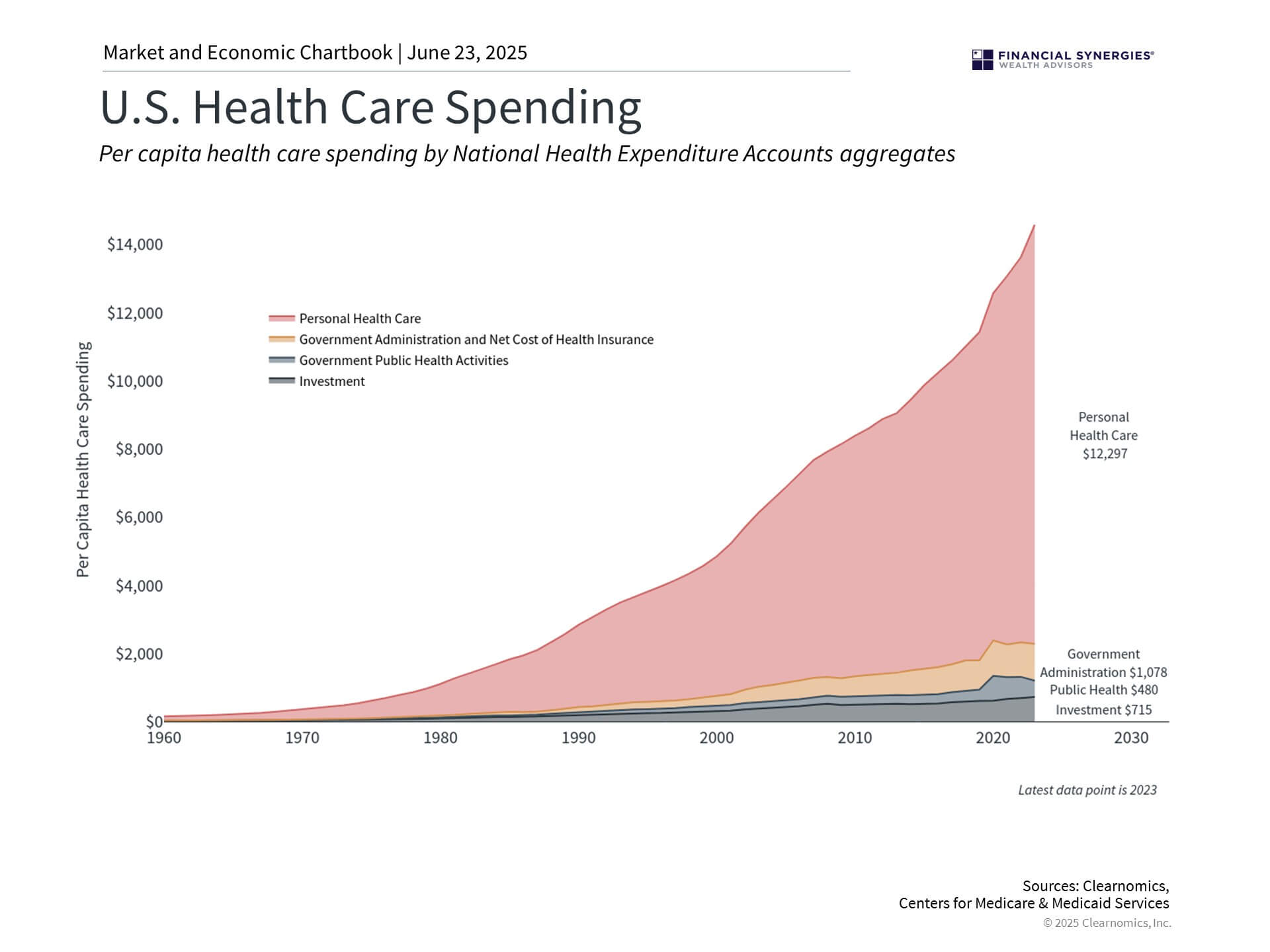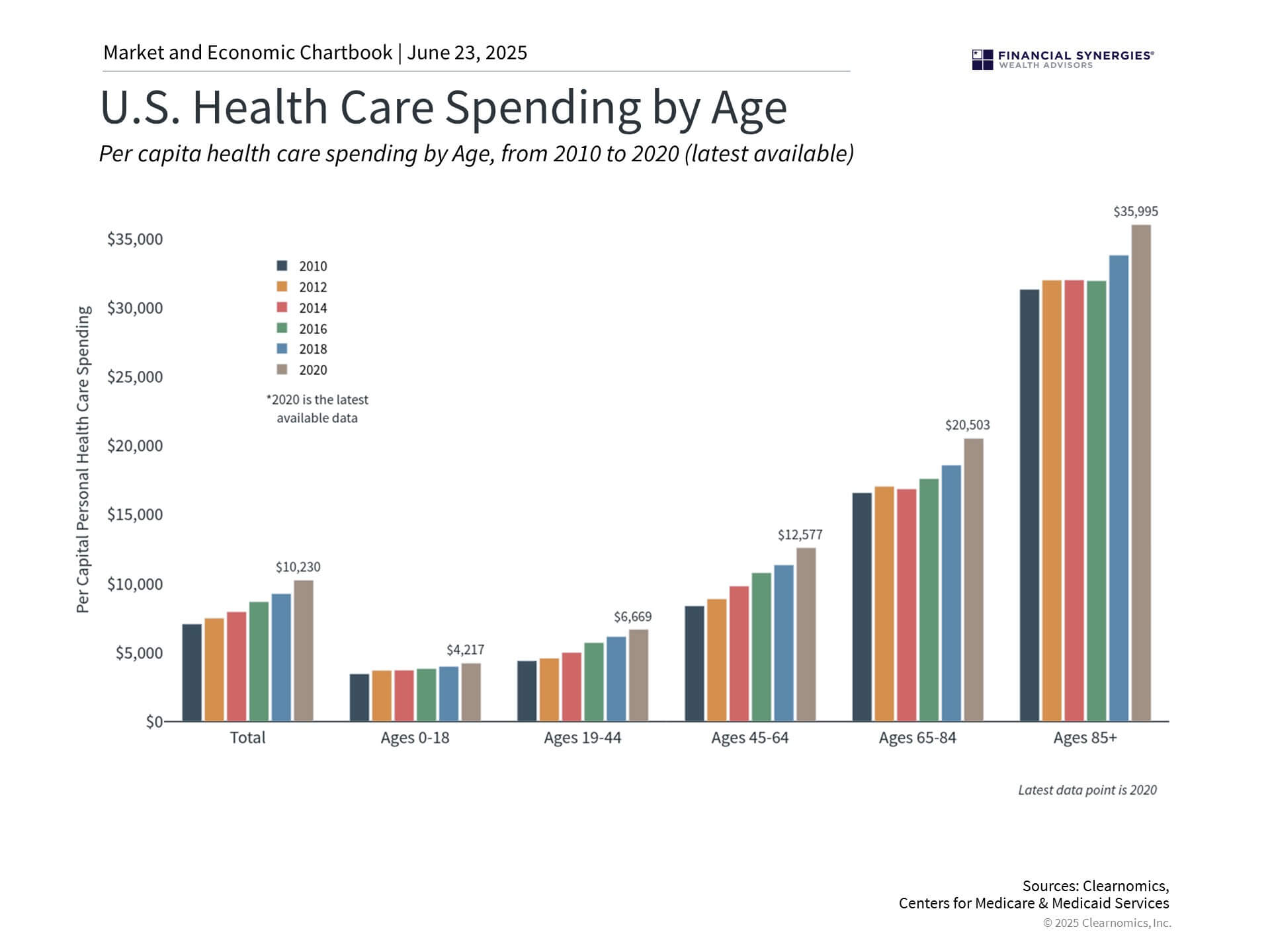- June 24, 2025
- Mike Minter

Planning for Rising Health Care Costs and the Role of HSAs
Health care is a constant consideration in financial planning, as it inevitably affects everyone at some point in life. The cost of health care continues to climb with no signs of slowing down, making it one of the most significant expenses in retirement.
A 65-year-old retiring today could spend approximately $165,000 on health care throughout retirement, according to recent estimates – and that figure nearly doubles for couples.1 As Americans live longer, preparing for these expenses becomes an essential component of any comprehensive financial plan.
There are various approaches to addressing future health care costs including tax-advantaged savings accounts, Medicare supplemental insurance policies, long-term care insurance, and strategic retirement income planning. Each approach offers unique advantages depending on an individual’s health status, financial situation, and retirement timeline.
Taking a multi-faceted approach that combines several of these strategies often provides the most comprehensive protection against escalating health care expenses.
In particular, Health Savings Accounts (HSAs) stand out as a helpful yet underutilized tool available to eligible individuals. Since their introduction in 2004, HSAs have evolved from a relatively unknown option to one of the more tax-advantaged vehicles in the financial planning landscape.
HSAs are typically available only to those who have high deductible health care plans, but can dramatically improve both current tax situations and long-term financial security.
Health care costs continue to rise at an alarming rate

The growth in health care expenditures in the United States has been remarkable over the past several decades. In 2023, health care spending reached $4.9 trillion nationally – approximately $12,297 per person each year, and nearly 18% of GDP.2 This marks a dramatic increase from just 5% of GDP in 1962.
Multiple factors drive this persistent growth, including an aging population, rising prevalence of chronic conditions, advances in medical technology, broader insurance coverage, and overall health care cost inflation.
So, what financial planning strategies are available? This should be considered across three areas:
- Tax planning: Identifying strategies to fund health care expenses in a tax-advantaged manner, such as HSAs, and deciding whether to let these accounts grow in a tax-friendly way.
- Retirement planning: Understanding your future health care needs and determining the best funding vehicles. Again, HSAs can play an important role.
- Estate planning: In the event you don’t utilize your health care allocation, assessing how different vehicles like HSAs will be treated becomes a worthy consideration.
HSAs offer significant tax advantages with growing contribution limits
For those who qualify, HSAs are a valuable financial planning tool. HSAs are available to individuals enrolled in high-deductible health plans (HDHPs), which in 2026 means plans with minimum deductibles of $1,700 for individuals or $3,400 for families.3
What makes HSAs truly unique is their tax treatment. They are the only financial vehicle that offers triple tax advantages:
1. Tax-deductible contributions: Funds contributed to an HSA reduce your taxable income in the year of contribution, providing immediate tax savings.
2. Tax-free growth: Any interest, dividends, or capital gains earned within an HSA accumulate completely tax-free.
3. Tax-free withdrawals: When used for qualified medical expenses, withdrawals from HSAs are entirely tax-free, regardless of when they occur.
This combination of tax benefits makes HSAs mathematically superior to both traditional and Roth retirement accounts when the funds are used for qualifying health care expenses.
Contribution limits for HSAs have steadily increased over time. For 2026, the IRS allows contributions of up to $4,400 annually for individual coverage and $8,750 for family coverage, representing a 2.3% increase from the previous year.
Individuals aged 55 and older can make an additional $1,000 in catch-up contributions annually. These contributions can come from you, your employer, or a combination, but cannot exceed the annual limits.
HSAs can transform retirement planning

With average life expectancies now extending well into the 80s for those over 65, the financial implications of extended retirement years have become increasingly significant, especially related to health care expenses.
One of the most advantageous HSA strategies – and one that many account holders overlook – is to treat your HSA as a specialized retirement account specifically for health care expenses. This approach involves maximizing annual HSA contributions while potentially paying some of your current medical expenses out-of-pocket.
In this case, keeping receipts for qualified medical expenses you pay out-of-pocket is helpful, as these can be reimbursed from your HSA at any point in the future – even decades later – with no time limit.
Health care costs are highest in retirement

The key to implementing this strategy is that HSA funds are invested for long-term growth – allowing HSA investments to gain tax-free over time. This is a critical step that many account holders miss, with most HSA providers offering various investment options. Over an extended time period, this can create a tax-advantaged reservoir specifically designated for retirement health care needs.
Unlike many retirement accounts, HSAs have no required minimum distributions during your lifetime, allowing for maximum tax-advantaged growth potential. Additionally, after age 65, HSAs become even more flexible, as the 20% penalty for non-health care withdrawals disappears. While non-qualified withdrawals would still be subject to ordinary income tax (similar to a traditional IRA or 401(k)), this flexibility makes HSAs particularly helpful for retirement planning.
HSAs can play a strategic role in estate planning
Beyond retirement planning, estate planning should be considered within your broader financial strategy. The treatment of HSA funds after death depends on the designated beneficiary, and can be a great way to carry forward the tax advantages to your spouse.
Specifically, if your spouse is the named beneficiary, the HSA transfers to them with all tax advantages intact. They can continue to use the account as their own HSA, maintaining all the triple tax benefits.
For non-spouse beneficiaries such as children or other individuals, the treatment is less favorable and can create a significant tax burden, especially if the HSA is sizable. In some situations, it may be more tax-efficient to name your estate as the beneficiary.
These estate planning considerations highlight the importance of integrating your health care funding strategy within your broader financial plan, ideally with guidance from a qualified financial advisor who understands both the tax implications and your personal circumstances.
The bottom line? Rising health care needs pose a significant financial planning opportunity. HSAs are a great tool for this purpose, with unmatched tax advantages for one of life’s largest expenses. For eligible individuals, HSAs are well worth incorporating into your financial planning strategy.
Sources:
1https://www.fidelity.com/viewpoints/personal-finance/plan-for-rising-health-care-costs
2https://www.ama-assn.org/about/ama-research/trends-health-care-spending
3https://www.irs.gov/government-entities/federal-state-local-governments/where-can-i-learn-more-about-health-savings-accounts-hsa-and-health-reimbursement-arrangements-hra
Concerns or questions about your financial plan or tax strategy? Contact Financial Synergies today.
We are a boutique, financial advisory and total wealth management firm with over 35 years helping clients navigate turbulent markets. To learn more about our approach to investment management please reach out to us. One of our seasoned advisors would be happy to help you build a custom financial plan to help ensure you accomplish your financial goals and objectives. Schedule a conversation with us today.
More relevant articles by Financial Synergies:
- 2024 Important Tax Numbers: A Handy Guide
- College Planning: Key Financial Considerations
- Top Client Questions: Fed, Debt, Trump
Blog Disclosures
This content, which may contain security-related opinions and/or information, is provided for informational purposes only and should not be relied upon in any manner as professional advice, or an endorsement of any practices, products or services. There can be no guarantees or assurances that the views expressed here will be applicable for any particular facts or circumstances, and should not be relied upon in any manner. You should consult your own financial advisors as to legal, business, tax, and other related matters concerning any investment.
The commentary in this “post” (including any related blogs, videos, and social media) reflects the personal opinions, viewpoints, and analyses of the Financial Synergies Wealth Advisors, Inc. employees providing such comments, and should not be regarded as the views of Financial Synergies Wealth Advisors, Inc. or its respective affiliates or as a description of advisory services provided by Financial Synergies Wealth Advisors, Inc. or performance returns of any Financial Synergies Wealth Advisors, Inc. client.
Any opinions expressed herein do not constitute or imply endorsement, sponsorship, or recommendation by Financial Synergies Wealth Advisors, Inc. or its employees. The views reflected in the commentary are subject to change at any time without notice.
Nothing on this website or Blog constitutes investment or financial planning advice, performance data or any recommendation that any particular security, portfolio of securities, transaction or investment strategy is suitable for any specific person. It also should not be construed as an offer soliciting the purchase or sale of any security mentioned. Nor should it be construed as an offer to provide investment advisory services by Financial Synergies Wealth Advisors, Inc.
Any mention of a particular security and related performance data is not a recommendation to buy or sell that security. Financial Synergies Wealth Advisors, Inc. manages its clients’ accounts using a variety of investment techniques and strategies, which are not necessarily discussed in the commentary. Investments in securities involve the risk of loss. Past performance is no guarantee of future results.
Any charts provided here or on any related Financial Synergies Wealth Advisors, Inc. personnel content outlets are for informational purposes only, and should also not be relied upon when making any investment decision. Any indices referenced for comparison are unmanaged and cannot be invested into directly. As always please remember investing involves risk and possible loss of principal capital; please seek advice from a licensed professional. Any projections, estimates, forecasts, targets, prospects and/or opinions expressed in these materials are subject to change without notice and may differ or be contrary to opinions expressed by others. Information in charts have been obtained from third-party sources and data, and may include those from portfolio securities of funds managed by Financial Synergies Wealth Advisors, Inc. While taken from sources believed to be reliable, Financial Synergies Wealth Advisors, Inc. has not independently verified such information and makes no representations about the enduring accuracy of the information or its appropriateness for a given situation. All content speaks only as of the date indicated.
Financial Synergies Wealth Advisors, Inc. is a registered investment adviser. Advisory services are only offered to clients or prospective clients where Financial Synergies Wealth Advisors, Inc. and its representatives are properly licensed or exempt from licensure. Investments in securities involve the risk of loss. Past performance is no guarantee of future results.




